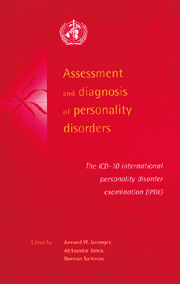 Assessment and Diagnosis of Personality Disorders
Assessment and Diagnosis of Personality Disorders Book contents
- Frontmatter
- Contents
- Contributors
- Preface
- Acknowledgements
- I Background and Field Trial
- Background
- Problems in the field of personality disorders
- Review of diagnostic instruments for the assessment of personality disorders
- Epidemiology of DSM-III personality disorders in the community and in clinical populations
- International personality disorder examination (IPDE)
- Experiences with the IPDE
- Field Trial
- II International personality disorder examination (IPDE) ICD-10 module
- Index
Epidemiology of DSM-III personality disorders in the community and in clinical populations
from Background
Published online by Cambridge University Press: 04 August 2010
- Frontmatter
- Contents
- Contributors
- Preface
- Acknowledgements
- I Background and Field Trial
- Background
- Problems in the field of personality disorders
- Review of diagnostic instruments for the assessment of personality disorders
- Epidemiology of DSM-III personality disorders in the community and in clinical populations
- International personality disorder examination (IPDE)
- Experiences with the IPDE
- Field Trial
- II International personality disorder examination (IPDE) ICD-10 module
- Index
Summary
Although the early Greek philosophers wondered about the influence of personality on health, it is only recently that the epidemiology of personality disorders (PDs) has begun to be scientifically investigated. This is because we have now developed a number of standardized instruments to assess personality and PD in an empirical fashion. The first comprehensive epidemiologic reviews in the English language have only been published since the mid-1980s. The need for the epidemiological investigation of PD seems justified for several reasons: firstly, as seen in the most recent epidemiological surveys, PDs are frequent and have been found in different countries and sociocultural settings; secondly, PDs can seriously impair the life of the affected individual and can be highly disruptive to societies, communities, and families; thirdly, personality status is often a major predictive variable in determining the outcome of psychiatric disorders and the response to treatment.
In this chapter we review the main epidemiological literature on PDs up to the end of 1993, focusing mainly on studies employing DSM-III or DSM-III-related measures of personality. Firstly community prevalence studies of PD will be reviewed. We then look at the prevalence of individual PDs in the community. Finally, we consider PDs in psychiatric populations. Many of the DSM-III categories of PD have counterparts in the ICD-10 classification; however, when this chapter was being written, there were no studies yet which directly employed ICD-10 criteria.
- Type
- Chapter
- Information
- Assessment and Diagnosis of Personality DisordersThe ICD-10 International Personality Disorder Examination (IPDE), pp. 18 - 42Publisher: Cambridge University PressPrint publication year: 1997
- 9
- Cited by


